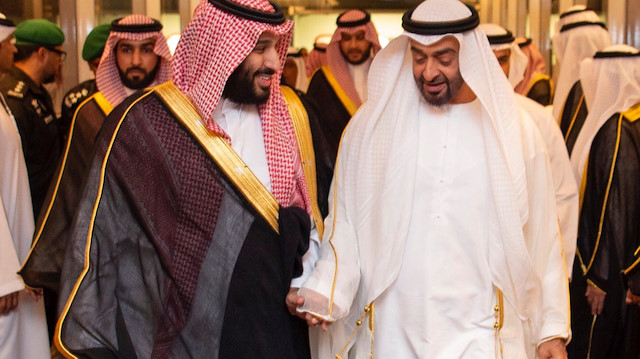

Saudi Crown Prince Mohammed bin Salman walks with Abu Dhabi's Crown Prince Sheikh Mohammed bin Zayed al-Nahyan
Senior Israeli officials, including premier Netanyahu, visited several Gulf states in recent weeks
A flurry of visits by senior Israeli officials to Arab Gulf states reflects a rush by Gulf countries to “befriend” with Israel, analysts believe.
“The peace rail link between Israel, Jordan, Saudi Arabia, and the Gulf countries is an economic normalization at the expense of the Palestinians and their rights,” Khalil Shahin, a Palestinian political analyst, told Anadolu Agency.
“This indicates that the Arabs no longer see the Israeli occupation of Palestine and Israeli practices as the main threat in the Arab region and the Middle East, but radicalization, extremism and Iran,” he said.
Last month, Israeli Prime Minister Benjamin Netanyahu paid a surprise visit to Oman upon an invitation from the ruler of the Gulf state, according to Netanyahu’s office.
Israeli Communication Minister Ayoub Kara also visited the United Arab Emirates (UAE) to attend a conference held in Dubai. A similar visit was paid by Israeli Culture Minister Miri Regev to Abu Dhabi, where Israel attended the Judo Grand Competition in the capital.
Israel’s Economy Minister Eli Cohen has also been invited to attend an international high-tech conference in Bahrain, according to Israeli media.
Israel does not have diplomatic relations with Bahrain, Oman or the UAE.
Shahin believes that the Arab countries are now turning their back to the 2002 Arab peace initiative.
“This poses a major danger to the Palestinian cause,” he said.
The Saudi-proposed initiative offers Israel full diplomatic recognition from the Arab states in return for an Israeli withdrawal from Arab land occupied in 1967 and the establishment of a Palestinian state.
- Saudi-Israeli ties
In another sign, Saudi Crown Prince Mohammed bin Salman met with a group of American evangelical Christians in Riyadh, in a move seen by analysts as an attempt to clear his name in the wake of the murder of Saudi journalist Jamal Khashoggi in the Saudi Consulate in Istanbul.
“With no doubts, Israel has worked hard to polish the reputation of bin Salman and therefore the crown prince and Saudi Arabia have to pay the price by accelerating normalization with Israel,” Abdel-Sattar Qasem, a Palestinian political analyst, said.
“He is weak inside and outside Saudi Arabia and his options have become increasingly narrow,” Qasem added.
“Bin Salman believes that the only way out of his crises is by normalizing relations with Israel, even if this comes at the expense of the Palestinians,” he opined.
The Palestinian analyst argued that bin Salman owes to Netanyahu for his role in lobbying U.S. President Donald Trump in his favor regarding Khashoggi’s murder.
Khashoggi, a Saudi national and columnist for The Washington Post, was killed on Oct. 2 inside the diplomatic facility in Istanbul.
After weeks of denying involvement, Saudi Arabia admitted that Khashoggi had been killed at the consulate but claimed the Saudi royal family had no prior knowledge of a plot to murder him.
Last month, the Israeli premier condemned Khashoggi’s killing as “horrendous”, but called for maintaining stability in Saudi Arabia.
“Netanyahu considers bin Salman a partner in the liquidation of the Palestinian cause and his loss means a painful blow to him and to what is called ‘the deal of the century’ that seeks to undermine the rights of the Palestinians,” Qasem said.
The so-called “Deal of the Century” is a U.S. backchannel plan to reach a peace settlement between Israel and the Palestinians.
The Palestinians have rejected any U.S. mediation in peace talks with Israel since Trump unilaterally recognized Jerusalem as the capital of Israel, triggering world outcry.
Jerusalem remains at the heart of the Middle East conflict, with Palestinians hoping that East Jerusalem -- occupied by Israel since 1967 -- might eventually serve as the capital of an independent Palestinian state.
“The murder of the Saudi journalist in Istanbul not only exposed the Israeli-Saudi relations but made it even closer,” Qasem argued.
-Final cards
Mahdi Abdul Hadi, a Palestinian expert in Israeli affairs, said both Netanyahu and bin Salman are trying to divert attention away from their internal failures by creating external enemies such as extremism and Iran.
"Both accuse Iran of destabilizing regional security and supported recent U.S. sanctions on Iran, which most of the world countries oppose,” he said.
The expert opined that the nature of Saudi-Israeli relations is based on the interests of the two leaders and “their vision for the future of the region, namely the formation of an Arab-Israeli alliance to confront Iran”.
“All this comes with the blessing of the Trump administration, which seeks peace in the region by achieving economic normalization between the Gulf countries and Israel and creating an Arab coalition against Iran, not through solving the Palestinian issue,” Abdul Hadi said.
Netanyahu has been facing corruption charges in Israel, which risks costing him his job.
According to the Palestinian expert, both Netanyahu and bin Salman are weak and playing their final cards.
“Both are facing many challenges and piling mistakes, which will definitely lead to their end,” he said.
#Gulf
#Israel
#Jamal Khashoggi
#Mohammed bin Salman
#normalization
#Saudi Arabia

